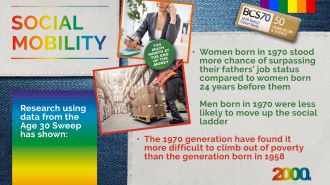- Our studies
- Our research
- Publications and resources
- Data access and training
- About
- News
- Events
- Get in touch
- Join our mailing list
Welcome to our news and blogs section. Here you’ll find the latest developments and insights from across our longitudinal studies.
Growing Up in the 2020s is the country’s first comprehensive long-term study tracking adolescents’ development and educational outcomes following the Covid-19 pandemic.

The Centre for Longitudinal Studies (CLS) is part of the team behind a new cohort study of current Year 11 students, which will investigate the educational and employment inequalities brought about by the COVID-19 crisis.

From this summer, we hope to start catching up with our BCS70 participants to see how they’re faring in their early 50s.

Researchers from around the world have been using CLS study data to tackle important questions. Here is a round-up over 40 new pieces of research that we’ve added to the CLS bibliography between October and December 2020.

Researchers from around the world have been using CLS study data to tackle important questions. Here is a round-up over 100 new pieces of research that we’ve added to the CLS bibliography between April and September 2020.

Celebrating 50 years of the 1970 British Cohort Study – BCS70 has been one of the leading sources of evidence on social mobility, informing a series of impassioned academic debates on this topic.

Celebrating 50 years of the 1970 British Cohort Study – BCS70 findings on adult numeracy and literacy helped to kickstart a series of government education initiatives that would improve the basic skills of millions of British adults during the 2000s.

Children growing up in families with expensive homes have fewer emotional and behavioural problems, finds new research led by the UCL Centre for Longitudinal Studies (CLS) based at the UCL Social Research Institute.

Celebrating 50 years of the 1970 British Cohort Study – Few pieces of longitudinal research have had such an impact on government policy as Leon Feinstein’s analysis of BCS70, which examined the links between family background and children’s cognitive development.

How much does one’s family background influence their midlife wellbeing? And, what effect does technology engagement have on teenage sleep? What is the psychological impact of having to work part-time when full-time jobs are not available? And, how important is cognitive ability in helping people climb the social ladder?

Members of Generation X who lived in Britain’s declining industrial heartlands in the 1980s were more likely to play truant during their school years and to be involved in crime as adults, compared to those who grew up in more advantaged areas.

Are boys more sensitive to the state of the local job market when choosing their GCSE subjects? And why are migrant and ethnic minority mothers at increased risk of mental ill health? Researchers have been using CLS study data to tackle these and other key questions.
Ryan Bradshaw
Senior Communications Officer
Phone: 020 7612 6516
Email: r.bradshaw@ucl.ac.uk